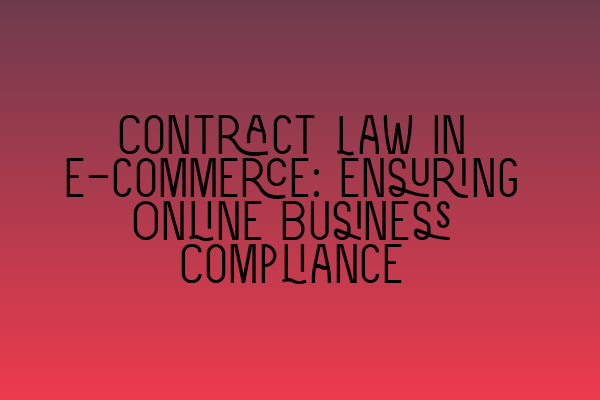Contract Law in E-commerce: Ensuring Online Business Compliance
As e-commerce continues to grow at an unprecedented pace, it has become increasingly important for businesses to understand and comply with contract law. Online transactions come with their own set of unique challenges and legal considerations, and failure to address these issues can have serious consequences for both businesses and consumers. In this article, we will explore the importance of contract law in e-commerce and provide essential guidance on how online businesses can ensure compliance.
1. Understanding Contract Law in E-commerce
Contract law forms the foundation of any business transaction, and e-commerce is no exception. In simple terms, a contract is a legally binding agreement between two or more parties. For e-commerce, contracts are typically formed electronically, through terms and conditions, privacy policies, and purchase agreements.
2. The Role of Terms and Conditions
Terms and conditions serve as the contract between a business and its customers. They outline the rights and responsibilities of each party and establish the rules of engagement for the online transaction. It is essential for businesses to have clear and comprehensive terms and conditions that cover areas such as pricing, payment methods, delivery, returns, and dispute resolution.
When drafting terms and conditions, businesses should seek legal advice to ensure compliance with relevant laws and regulations. It is also important to make the terms and conditions easily accessible on the website, and customers should be required to acknowledge and accept them before proceeding with a purchase.
3. Privacy Policies and Data Protection
In the digital age, privacy has become a hot topic, and businesses must take special care when handling customer data. A privacy policy is a legal document that informs customers about how their personal information will be collected, used, and protected. It is not only a legal requirement for many businesses, but also a vital trust-building tool for customers.
When creating a privacy policy, businesses should be transparent about the type of data collected, how it will be used, and any third parties with whom it may be shared. Compliance with data protection regulations, such as the General Data Protection Regulation (GDPR) in Europe, is essential, and businesses should ensure that their data collection and storage practices align with these laws.
4. Ensuring Valid and Enforceable Contracts
For an e-commerce contract to be valid and enforceable, certain criteria must be met. These criteria include mutual assent, offer and acceptance, consideration, and capacity to contract. It is important for businesses to ensure that these elements are present in their online transactions.
Mutual assent refers to the intention of both parties to be bound by the terms of the contract. This can be demonstrated through actions such as clicking an “I agree” button or completing a purchase. Offer and acceptance occur when one party makes an offer and the other party accepts it. Consideration refers to the exchange of something valuable, such as money or goods, between the parties. Lastly, capacity to contract means that both parties have the legal ability to enter into a contract.
5. Dispute Resolution and Jurisdiction
In the event of a dispute, it is important for e-commerce businesses to have clear provisions in their contracts regarding dispute resolution and jurisdiction. This can help avoid costly and lengthy legal battles. Options for dispute resolution include negotiation, mediation, arbitration, or litigation.
Businesses should also consider specifying the jurisdiction and governing law that will apply to their contracts. This can streamline legal proceedings and provide clarity for both parties involved.
6. Additional Considerations for International E-commerce
International e-commerce introduces additional complexities due to differences in laws and regulations between countries. For businesses operating internationally, it is crucial to understand and comply with the laws of each jurisdiction in which they operate. This includes areas such as consumer protection, tax regulations, and intellectual property rights.
Engaging the services of a solicitor with expertise in international contract law can help businesses navigate these challenges and ensure compliance with applicable regulations.
In conclusion, contract law plays a vital role in ensuring compliance and legal protection for businesses engaged in e-commerce. By understanding and addressing the unique challenges presented by online transactions, businesses can establish trust with their customers, minimize legal risks, and foster long-term success. Staying informed about the latest developments in contract law and seeking expert legal advice when needed will enable businesses to navigate the complex landscape of e-commerce with confidence.
For more information on related topics, we recommend these articles:
– LLC Formation Made Simple: Step-by-Step Guide for UK Entrepreneurs
– Business Regulations in the UK: A Comprehensive Overview
– SQE Workshops and Webinars: Accelerate Your Exam Preparation
– Delaware Corporate Law for UK Solicitors: Key Insights and Practices
– Demystifying the Solicitors Qualifying Examination Format
Remember, it is always best to consult with a qualified solicitor to ensure compliance with contract law in your specific jurisdiction and industry.
